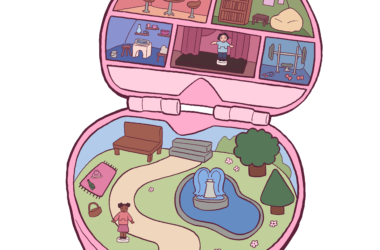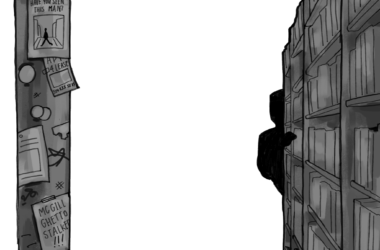When the Beatles sang about “the dirty story of a dirty man,” who longs to be a “Paperback Writer,” they accurately depicted the stereotypes that still surround popular genre fiction. You know the type; you might even know it intimately. Trashy romance novels, fantastical sci-fi, horror stories, detective mysteries, even the more highly acclaimed chick lit and dick lit genres fit into this category. These novels, with their eye-catching covers, stock characters and formulaic plotlines, somehow earn a bad reputation with critics who read solely to enrich their intellectual capacities.
But does mainstream fiction deserve the slander that it receives?
Often, it does. A novel such as Carly Phillips’, Hot number, which contains enlightening descriptions of the romantic heroine “kissing those sculpted lips, threading her fingers through that thick brown hair and scraping her cheeks against his short, scruffy beard,” is probably not going to earn a thumbs-up from the New York Times Book Review. Yet Phillips, like her popular genre counterparts Nora Roberts, Stephen King and Dan Brown, all top the same paper’s Bestseller lists week after week.
Is this merely a case of an entertainment-seeking, unintelligent population of readers? McGill Cultural Studies professor Derek Nystrom believes that readers (and writers) of so-called “trashy novels” do not get the credit that they deserve. “When a novel becomes popular, you want to ask why. The popularity of genre fiction is not completely a case of an undiscerning [reading] public.” Nystrom himself admits to being a fan of the “dick lit” novelist Nick Hornby. “High Fidelity,” he confesses, “hit a little bit too close to home.”
The idea of a novel “hitting too close to home” is specifically what makes genre fiction a worthy contribution to the world of literature. “I identified with the main character in The Devil Wears Prada because she expresses herself like a real person,” proclaims Jennie Hugh, U3 Anatomy. Although popular novels are defamed for their unrealistic interpretation of life, a closer look at cheesy Danielle Steels and suspense-driven John Grisham page-turners reveals that their depiction of life is closer to reality than we think.
“It is a truth universally acknowledged, that a single man in possession of a good fortune, must be in want of a wife.” (Jane Austen, Pride and Prejudice)
“Was Jane Austen the ‘chick lit’ of the Regency Era? Of course,” declares Irish Times reporter Declan Kiberd in a Sept. 5 article. Like her modern-day counterparts, Jennifer Weiner and Helen Fielding, Austen received (and still receives) a fair amount of scorn. Structurally, chick lit novels resemble the commonly ridiculed Harlequin romances, although Nystrom clarifies that “they differ in that the writer possesses a highly discernable voice.”
In her blog, Jennifer Weiner (author of In Her Shoes), recognizes that chick lit is labeled as “sexist… with the built-in implication that what you’ve written is a piece of beach-trash fluff… that doesn’t deal with anything other than boys and shoes.” Even Weiner would have to acknowledge that when a novel titled Confessions of a Shopaholic hits the bookstore shelves sporting a bright pink cover, “beach-fluff” makes for a rather appropriate term of description.
But then again, Austen’s words continue to ring true. It is still a universal acknowledgement that a single man (preferably in possession of a good fortune) must be in want of a wife. And by that same token, a single woman (in possession of an equally good fortune), must be in want of husband. Whether or not you agree, the issue remains. Today’s readers continue to grapple with traditional gender roles in modern relationships.
Andrea Braithwaite, a graduate student studying popular literature and media in the Department of Communications, claims that chick lit novels “address issues such as why women feel they have to marry [to begin with]. …A lot of these novels feature protagonists whom the writer has a hard time locking into monogamous relationships.” Even if the heroine decides to wed her own personal Mr. Darcy, Braithwaite asserts “that doesn’t change the fact that throughout the course of the book, these women are asking themselves: ‘is this what I want? How do I go about finding something that works for me and my priorities?'”
The pressure to prioritize affects male characters, as well as female ones. “There is a lot of confusion for men’s roles in relationships,” says Braithwaite, noting that popular dick lit novels by Nick Hornby and Mike Gayle recurrently ponder the “crisis of masculinity.”
“‘O brave new world!’ It was a challenge, a command.” (Aldous Huxley, Brave New World)
Aldous Huxley may have coined the title, but in essence, every science fiction novel imagines a “Brave New World” that is able to transform the society portrayed in the chick and dick lit genre. Communications Professor William Straw recalls “people used to say that we read science fiction to imagine better worlds. I think that’s a bit of it.”
Nowadays, this idea of a “better world” outside of our own world has ingrained itself in the minds of readers, who, according to reporter Steven Anderson’s Sept. 29 article in the Globe and Mail, are buying more and more apocalyptic-type fantasy novels. Keeping in mind the instability that shook the world after 9/11, Hurricane Katrina and the 2004 tsunami, Straw is not surprised at this development.
“It’s that sort of comfort factor,” Braithwaite insists. “These books make us think about things that happen in our lives, whether they’re big and catastrophic or personal dilemmas.”
Science fiction novels often reflect issues of race and gender in ways that realistic novels cannot. In a fantasy world, Braithwaite says, “it is possible for a writer to ponder the question of why we have gender in the first place.” Sci-fi writer Ursula K. Le Guin, for example, expounds upon this idea by creating a genderless population in her popular novel, The Left Hand of Darkness. For years, the genre has made it possible for readers to imagine a world that operates on a completely different and better level. “Even Star Trek, early on, showed blacks and whites working alongside each other in a way that contemporary genres wouldn’t have allowed,” Straw claims. “It [Science Fiction] offers problems for solving contemporary problems in a future world.”
But are we running from our problems by trying to escape in books? “Absolutely not,” says Nystrom, who believes that escapism is not such a negative idea. “Fantasies,” according to Nystrom, “are just as interesting as realities. Fictional worlds aim to reorder the world of reality. We need to focus on that reorder.” Science Fiction, perceives Nystrom, is not about avoiding reality, it is about “real life concerns played out in a different kind of way.”
Escapism is more than convenient; it is essential. “I don’t think that the negative connotations of escapism really do justice to the fact that everyone needs a fantasy life,” claims Braithwaite. “We need a place to explore different sides of our identity without the negative repercussions of what would happen in the real world.” After reading Harry Potter, who does not want to be a wizard?
“People want to know why I do this, why I write such gross stuff.” (Stephen King)
“Part of what popular fiction does,” says Braithwaite, “is… making us think about things that happen in our lives, whether they’re big and catastrophic or personal dilemmas. They [genre novels] become a kind of therapy of being able to think about, read about and talk about these issues from different kinds of positions.” Braithwaite, a self-proclaimed fan of Janet Evanovich mysteries, notes that “people tend to gravitate to certain kinds of genres that offer different types of securities. We like popular genres because they’re so familiar. There’s a formula for how things play out.” In an unstable world, a novel that reads like a formula suddenly doesn’t seem so adver
se to the human psyche.







